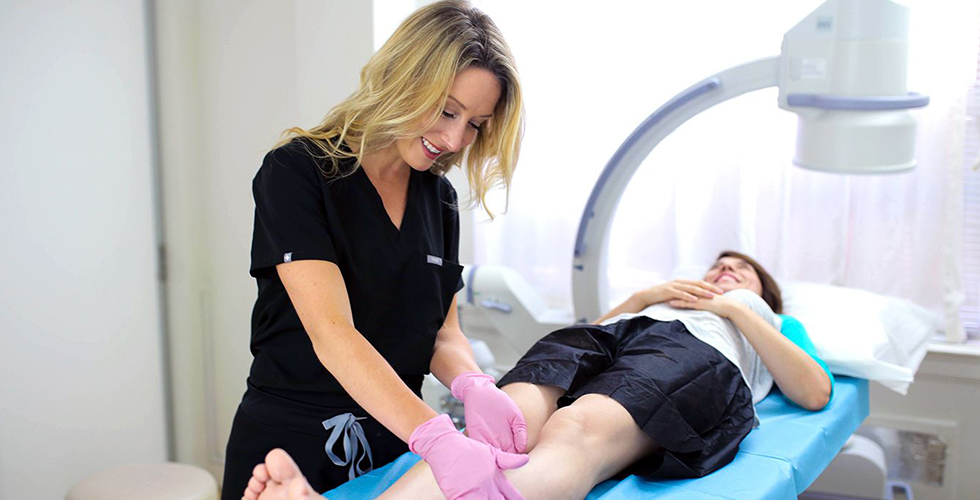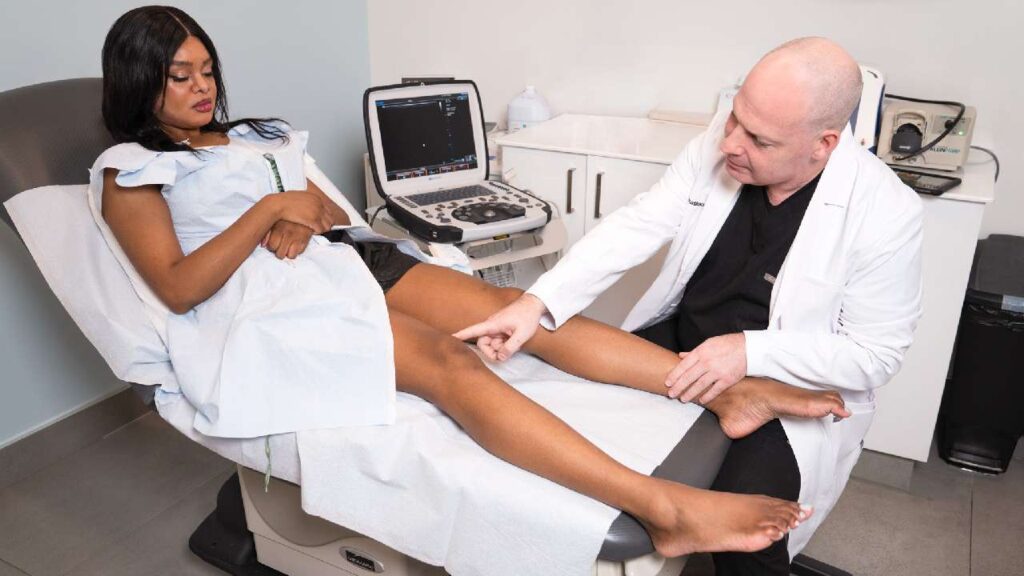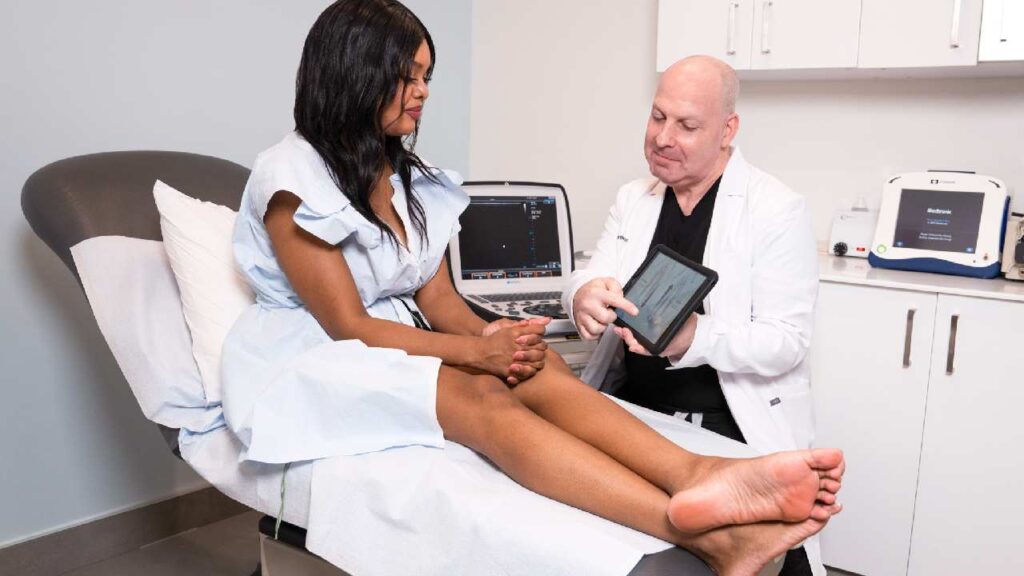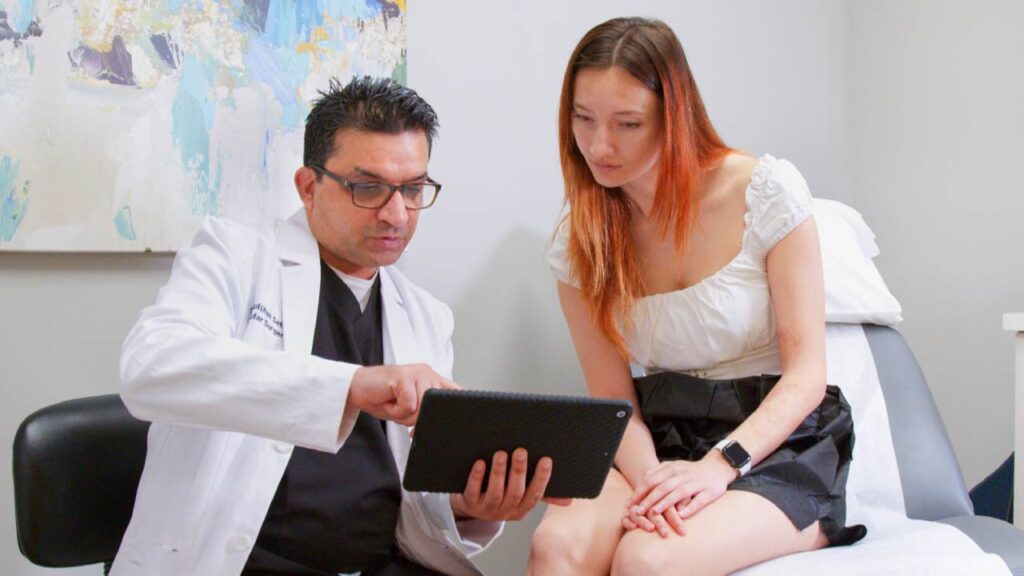What Is a Varicose Vein Doctor Called?
There are several titles for a person who treats vein issues. The most common are vein doctor, vein specialist, phlebologist, and vascular surgeon. What do the titles mean, and what do each of these physicians do? Some specialists can only use non-invasive treatments. Others can use non-invasive and minimally invasive vein treatments. And some perform vein surgery. There are also surgeons who perform less invasive treatments. Book an appointment with the top vein specialists in New York to access to the full range of vein treatments. Read on to learn more about each type of specialist.

What Is an Accurate Phlebology Definition?
Phlebology is a branch of medicine concerned with veins and vein diseases. It’s derived from the word “phlebos” which means “blood vessels” in Greek. Phlebologists have specific training in diagnosing, treating, and preventing issues like varicose veins, spider veins, blood clots, phlebitis, and Chronic Venous Insufficiency.
Many phlebologists are also board certified in complementary fields like vascular surgery, internal medicine, pain medicine, or anesthesiology. This gives them additional insight into vein care. Phlebologists are often the best doctors for varicose veins and spider veins because these usually require minimally invasive vein treatment. You’ll learn more about that below.
Which Vein Specialist Uses Non-Invasive Vein Treatments?
There are three broad categories of vein treatment: non-invasive, minimally invasive, and invasive. Non-invasive vein treatments don’t “invade” the skin, meaning there are no injections or incisions. These include compression stockings, surface laser treatments, and lifestyle adjustments like elevating your legs while at rest.
Specialists who only perform non-invasive vein treatments are probably not vein doctors. Vein doctors can use non-invasive methods, but they also use more in-depth procedures. If the provider doesn’t offer treatments like endovenous laser treatment or radiofrequency ablation, ask what their credentials are. It’s likely they studied dermatology, cosmetic surgery, or another non-vascular specialty. These are not the best doctors for varicose veins. Varicose veins are larger than facial spider veins and broken capillaries, and they require a different approach.
Which Vein and Vascular Specialist Is Minimally Invasive?
Minimally invasive vein doctors are often called vein specialists or phlebologists. They are often board certified by the American Board of Venous and Lymphatic Medicine (ABVLM board certified). These physicians are trained in the latest procedures for varicose veins, and many of them also have ultrasound training. This is an important distinction because varicose veins often stem from valve failure in deeper veins. Ultrasound-guided procedures help vein doctors identify and treat the cause of the varicose vein, as well as the vein itself, to prevent a recurrence of varicose veins.
Cosmetic treatments don’t suffice for larger, deeper veins in the legs. Look for a phlebologist or board certified vein specialist who offers vein treatments like sclerotherapy, endovenous laser ablation, radiofreqeuncy ablation, mechanochemical ablation, and vein adhesives. These are the best procedures for most varicose veins.
Which Doctor Performs Surgical Treatment for Varicose Veins?
Vascular surgeons perform surgical treatment for varicose veins, including phlebectomy (ligation and stripping) and ambulatory phlebectomy. They complete residency programs in surgery after obtaining their medical degree and are certified by the American Board of Medical Specialties (ABMS board certified). Surgery was once a first line of treatment for varicose veins, but it’s now a last resort.
New technology has largely replaced the process of surgical extraction. Vein doctors can now close veins off inside the body and reroute blood into other veins, rather than cutting veins out of the body. Non-surgical methods are safer, faster, gentler, and more affordable for most patients. They also have a lower incidence of varicose vein recurrence. Many vascular surgeons are getting certified in phlebology so they can use these treatments instead. If you choose a vascular surgeon, verify that they’re also a phlebologist.
However, some patients with blood clots or veins that are too twisted to safely treat with endovenous devices might need varicose vein surgery. For these patients, newer surgeries, like ambulatory phlebectomy, might be an option to minimize recovery time. While it’s no longer as common to have varicose vein surgery, the right doctors can make it easier for patients than in prior decades. Find the best vascular surgeons below.
Who Are the Best New York Varicose Vein Surgeons Near Me?
If you do need vein surgery, choose a vascular surgeon who’s trained in the latest modalities. For instance, ambulatory phlebectomy does not require general anesthesia, and it uses punctures rather than large incisions. For the latest surgical treatments in New York, visit Dr. Sareh Rajaee, a Yale-trained vascular surgeon who also specializes in minimally invasive vein care.
Which Doctor Can Prevent Varicose Veins Treatment Surgery?
If you want to avoid surgery, Dr. Rajaee will explore non-surgical solutions with you. She and her colleagues are all renowned minimally invasive vein doctors with Ivy League training. Visit Dr. Andrew Cortes, Dr. Michael Nguyen, Dr. Juan Montoya, or Dr. Rajaee for surgical alternatives.
Which Doctor Knows How to Take Care of Veins and CVI?
If you have varicose veins, it’s likely you also have Chronic Venous Insufficiency (CVI). You need a vein doctor who treats this too, so you don’t continually develop varicose veins or spider veins. The best doctors for CVI are minimally invasive vein specialists like phlebologists. CVI can’t be resolved with non-invasive treatments, but it rarely requires invasive surgery. A minimally invasive approach is often the best solution. If you’re searching, “What is a varicose vein specialist called,” look for the specialist’s title and credentials, but also determine whether they treat CVI. This is key to long-term vein relief.
Who’s the Best Vein Doctor for Varicose Veins in Neck?
Varicose veins can develop anywhere, but they’re more common in the lower body. That’s because CVI takes a bigger toll on leg veins, which must work against gravity and bear your body weight while pumping blood to the heart. If you develop varicose veins in the neck, you may have a central venous blockage. This requires ultrasound tests to detect, so choose a board certified vein doctor, not a cosmetic vein specialist.
In addition, veins in the neck sometimes bulge from a condition called jugular vein distension. This is different from varicose veins, and it is a hallmark symptom of heart failure. Jugular vein distension is not painful like varicose veins can be, and these veins aren’t as twisted as varicose veins are. See a vein doctor promptly for bulging veins in the neck to find the cause.
Who Knows How to Prevent Varicose Veins and Spider Veins?
In addition to providing spider and varicose veins treatment, a good vascular doctor will also advise you on how to prevent them. Certain factors are beyond our control, like genetics, gender, aging, and hormone changes. But other contributors like obesity, sedentary lifestyles, birth control usage, and smoking can be modified.
A qualified vein specialist will provide tips like elevating your legs above your heart for 15 minutes, multiple times a day, and changing positions often when you must sit or stand at work. Diagnosis and treatment are essential, but prevention is important too. So, choose a vein doctor who takes time to conduct a thorough medical exam and answer all of your questions.





